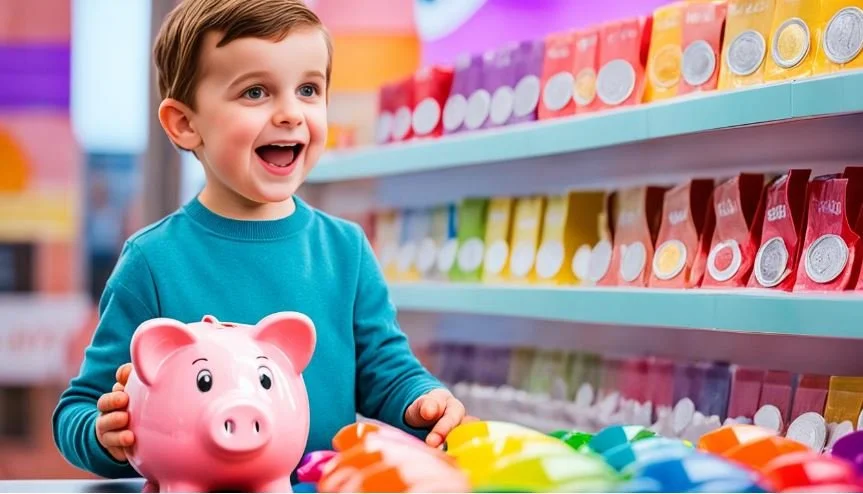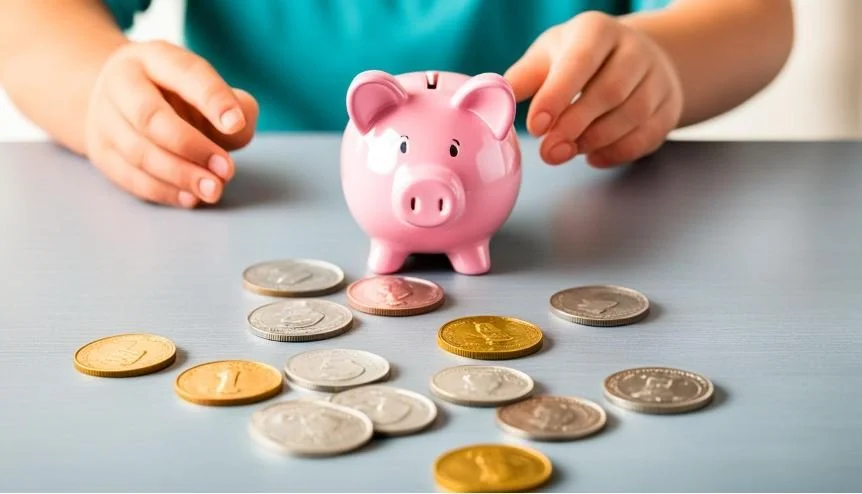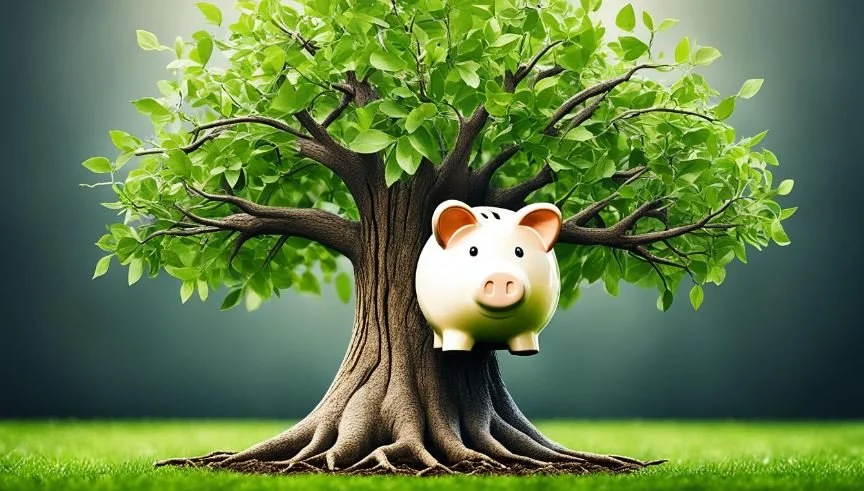What is your earliest money memory?
What is your earliest memory of money?
As we get older, our first memories of money often come from our childhood. These early experiences shape how we think and act with money. It could be getting your first pocket money, saving for something big, or learning from your parents. These moments can deeply affect our money habits as adults.
The Significance of Early Financial Experiences
Our childhood memories shape our money habits later in life. How we first learned about money can deeply affect our financial mindsets. This part looks at how our early money experiences shape our future financial habits.
Laying the Foundation for Money Mindsets
Learning about money as kids deeply influences our financial attitudes. Watching our parents spend and getting our first pocket money teaches us about money. These early experiences shape how we see and value money as adults.
Shaping Future Financial Habits
How we saw family budgeting and money lessons as kids affects our financial habits. Learning about saving, delaying gratification, and the value of hard work shapes our money skills. These financial literacy lessons guide us in managing money as adults.
"The way we were taught about money as children lays the foundation for how we approach our finances as adults." - Matthew McCabe Newcastle Advisors
Understanding our early money experiences helps us see our current money habits. It lets us take steps to improve our money habits for the future.
What is your earliest memory of money?
Looking back, our first memories of money are quite interesting. They shape how we think about saving, spending, and managing money later on. These early experiences are key to our financial habits.
Many Australians remember getting their first allowance or pocket money from parents or guardians. This was often the start of learning about budgeting and being responsible with money. We had to decide how to use our limited cash wisely.
Maybe your first memory is saving up for something big, like a toy, new shoes, or a family trip. The excitement of waiting and then getting what you wanted taught you a lot about money. It showed how you'd handle money in the future.
"My earliest memory of money was watching my parents sit around the kitchen table, discussing the family budget. I was fascinated by the way they carefully allocated their resources and planned for the future."
Or maybe your first memory was seeing your family talk about budgeting. Watching how your parents and grandparents made financial decisions shaped your view on money. These early lessons guide how we think about money today.
Every memory of money from childhood is unique. Reflecting on these moments helps us understand our financial attitudes better. It shows how our relationship with money has changed over time. By thinking about these early experiences, we can improve our financial habits for the future.
Childhood Allowances and Pocket Money
Many Australian kids start learning about money with an allowance or pocket money. These early experiences teach them about budgeting, saving, and spending. They help shape how we handle money later on.
Lessons in Budgeting and Saving
Getting a regular allowance or pocket money makes kids think more about their spending and saving. They learn about family budgeting and the value of waiting for things. These lessons stick with them as they grow and manage their own money.
"Childhood allowances and pocket money provide a safe environment for kids to experiment with money management and develop lifelong financial skills."
By saving some of their pocket money, kids learn about budgeting and the benefits of patience. This helps them understand money's value and the need for responsible financial habits.
Encourage regular allowances or pocket money to foster financial literacy.
Teach children the art of budgeting and the importance of saving.
Emphasize the long-term benefits of delayed gratification and goal-setting.
By teaching these lessons early, parents and guardians help their kids develop a good relationship with money. This prepares them for a future of financial stability and success.
Family Traditions and Money
How families talk about money deeply affects our financial views and actions. Saving for big events, talking about budgets, or sharing financial tips are key to shaping our money habits. This part looks at how family traditions and money habits shape our financial lives.
Many Australians picked up money lessons from their parents or grandparents. Some families saved for big buys or trips, teaching the value of waiting and setting goals. Others talked about budgets, showing kids how to manage money well.
"My parents always stressed the value of hard work and saving. We'd have family meetings to talk about our monthly expenses and plan for the future. Those conversations shaped my approach to money in a really positive way."
- Matthew McCabe Newcastle Advisors
Financial habits and views often go from one generation to the next. Grandparents and parents share their money stories and lessons. This helps future generations make smart money choices and have a good relationship with money.
Adding money talks and financial habits to family traditions helps kids get ready for the world of personal finance. Passing on financial knowledge from one generation to the next builds a strong base for future financial health.
The Joy of Saving for a Special Purchase
Many Australians remember the thrill of saving for something special as kids. It could be a new toy, a dream family trip, or a must-have item. This taught us the value of saving and patience.
Delayed Gratification and Goal-Setting
We always wanted the latest toy or gadget, but our parents made us save our pocket money. This taught us to set financial goals and enjoy watching our savings grow. Saving made us proud and helped us reach our dreams.
Getting the item we saved for felt amazing. It showed our hard work and discipline. These early saving lessons helped shape our financial habits. They taught us that waiting for good things is worth it.
"The best things in life aren't things." - Art Buchwald
Looking back, we see how these childhood lessons changed our money habits. They taught us about saving, setting goals, and waiting. These lessons guide our spending and help us manage our money better.
Money Lessons from Parents and Grandparents
Many of us learned important money lessons from our parents and grandparents. They share their financial wisdom, shaped by their life experiences. This knowledge helps us manage our finances better.
They teach us about budgeting and saving. These lessons can lead us to financial stability and success.
Passing Down Financial Wisdom
Our parents and grandparents teach us key money lessons. They talk about living within our means and saving for big purchases. These lessons help shape our financial literacy.
They share their financial stories and what they've learned. This helps us prepare for a secure financial future.
"My grandmother always told me, 'A penny saved is a penny earned.' Those words of wisdom have stuck with me my whole life and influenced how I approach family budgeting."
These lessons from older generations are powerful. They shape our money habits and set us up for good financial management.
By listening to our elders, we gain access to valuable knowledge. This helps us navigate our financial paths. Learning to save and the value of hard work are key lessons from them.
These money lessons from parents and grandparents are priceless. They shape our financial habits and help us secure our future.
The Value of Hard Work and Earning Money
For many Australians, earning their own money is a key part of growing up. It could be from chores, a part-time job, or starting their own business. This teaches them the value of money and how to be financially responsible.
Getting pocket money or a weekly allowance as a kid teaches important money skills. It shows how to budget, save, and reach financial goals. These early lessons help build good money habits that stick with them for life.
When kids do tasks like mowing the lawn or helping at home, they learn the true value of money. They see the worth of earning money by working hard. This feeling of achievement motivates them to keep improving their skills and work ethic.
Earning money and family budgeting are closely linked for many families. Parents use these moments to teach kids about using money wisely. They talk about setting financial goals and the joy of saving for something big.
"The best way to teach kids about money is to give them some and let them make mistakes." - Matthew McCabe Newcastle Advisors
Letting kids earn and manage their own money helps build a strong financial base. The lesson of hard work and earning money shapes their financial future. It affects how they make money decisions and manage their finances.
Money and Childhood Memories
Our first memories of money are often very special, bringing back feelings of nostalgia. These early experiences with money can shape how we think about money today. Reflecting on our what is your earliest memory of money? helps us understand how our childhood finances and money lessons affect our financial literacy.
Many of us remember getting pocket money or saving for something special. These early money memories are both sweet and a bit sad. They remind us of the fun and challenges of managing our money as kids. Earning our first money or watching our savings grow was exciting.
These childhood financial experiences have left a lasting impact on us. Now, as adults, these memories guide our financial decisions. Looking back at our money lessons gives us insights for better financial choices today.
"The way we think about and handle money is often rooted in our earliest experiences with it. Uncovering those formative memories can unlock deeper self-understanding and empower us to build a healthier, more fulfilling financial future."
Our money and childhood memories are important. They show us how our early money experiences shape our lives. By connecting with these memories, we gain wisdom and strength for managing our finances.
Teaching Kids About Money Today
As parents, grandparents, or mentors, we can shape the next generation's money habits. By teaching kids about money, budgeting, saving, and hard work, we help them have a good relationship with money early on. In today's world, knowing how to manage money is key. So, we need to find good ways to teach kids about their finances.
One good way is to mix money lessons into daily life. Let your kids help with the family budget to show them how money is spent and why. Encourage them to save for things they want, like a new toy or a family trip. Help them keep track of their savings and make smart spending choices.
Another great idea is to let your kids earn their own money through chores or small jobs. This teaches them the value of hard work and how to manage their money. Give them chances to decide how to spend their earnings. Use these times to talk about the choices they make and their effects.
Integrate money lessons into everyday family activities
Encourage children to save for specific goals
Teach the value of hard work by allowing them to earn their own money
Discuss the trade-offs and consequences of spending decisions
By teaching kids about money in a proactive way, we can give them a strong financial start. As parents and mentors, we can greatly influence our children's financial futures.
"The best way to teach your kids about taxes is by eating 30 percent of their ice cream." - Bill Murray
The Impact of Financial Literacy
Improving financial literacy for ourselves and the next generation greatly improves our financial health and life quality. It gives people the skills to make smart money choices. This helps them reach their financial goals and secure a bright future.
Empowering Future Generations
Financial literacy initiatives can empower future generations to make better money choices. When young people know how to budget, save, and borrow wisely, they can handle the financial world better. This helps them avoid big financial mistakes.
It also lets them share their knowledge, creating a positive change in communities. By teaching others, we make sure the next generation is ready to meet their financial goals. This secures their financial future.
"Financial literacy is the foundation for building a secure financial future, not just for ourselves, but for the generations that follow."
Financial literacy has many benefits, from saving money to managing debt and planning for the future. By focusing on financial education, we help people take charge of their finances. This leads to better financial decisions and a stronger society.
In conclusion, investing in financial literacy is a smart move for the future. It gives people the skills to make wise financial choices. This opens doors and secures the financial well-being of future generations.
Money and Self-Worth
How we see and deal with money deeply affects our self-worth and happiness. Bad money habits or childhood experiences can make us feel not good enough, ashamed, or out of control with money. This part looks at how money and self-worth are linked. It shows how changing these deep beliefs can help us have a better relationship with money.
As kids, we pick up certain ideas about money that influence our adult financial choices. If money was linked to feeling poor, guilty, or unworthy, changing these beliefs is hard. Yet, by facing these deep-seated thoughts, we can change how we see money. This leads to feeling more self-worth and confident about our finances.
Learning about money and developing good financial habits helps us find ourselves and gain power. By managing our money well, setting goals, and seeing money's true role in our lives, we see ourselves as capable and deserving. This boosts our well-being, showing we're worth more than our bank balance.
FAQ
What is your earliest memory of money?
Our first memories of money shape how we think about money and manage it later. It could be getting your first allowance, saving for something special, or seeing how your family talks about budgeting. These moments teach us a lot about our money habits.
How do childhood finances shape our money mindsets?
How we learned about money as kids affects how we see and handle it now. Things like family budgeting, advice from parents and grandparents, and managing pocket money shape our views on money. These early experiences guide our financial habits and decisions.
What role do family traditions play in shaping our financial literacy?
Family talks and actions with money shape our financial views and habits. Saving for big events, discussing budgets, or sharing financial tips are key to learning about money. These traditions help shape our financial literacy and mindset.
How can the joy of saving for a special purchase teach valuable lessons?
Saving for something special, like a new toy or a family trip, teaches us patience and goal-setting. This teaches us the value of saving and waiting, skills useful for our financial lives.
What money lessons can we learn from parents and grandparents?
Parents and grandparents greatly influence our money habits and views. Their money management and advice shape our financial behaviors. Learning from them can deeply affect our financial literacy and choices.
How can the experience of earning money shape our financial attitudes?
Earning money, through chores or a job, teaches us the value of hard work and money. This experience builds our financial skills and attitudes, making us appreciate money more.
How can nostalgia and financial reminiscence impact our present-day money mindset?
Our early money memories are special and can influence our current money views. They shape our financial decisions and mindset, affecting how we handle money today.
How can we effectively teach kids about money today?
We can shape the next generation's money attitudes by teaching them about finances. By sharing financial lessons, budgeting, saving, and the value of work, we help them develop a healthy money relationship early on.
What is the impact of financial literacy on our well-being?
Improving financial literacy for ourselves and others greatly benefits our financial health and life quality. It gives us the skills to make smart financial choices, helping us reach our goals and secure our financial future.
How does money affect our sense of self-worth?
Our money views and experiences can deeply affect our self-worth and well-being. Negative money beliefs from childhood can lead to feeling not good enough or lacking control over finances. Changing these beliefs helps us have a better relationship with money, boosting our self-worth and life quality.






